Sen. Tom Cotton, R-Ark., says the United States is losing its position of global leadership under an administration driven by political priorities rather than realities.
With threats growing and both allies and enemies doubting America’s ability to respond, Cotton told the Washington Examiner during an interview in his Capitol Hill office that the United States must respond strongly to incursions and put more pressure on bad actors, especially Russian President Vladimir Putin.
The former soldier who deployed to Iraq and Afghanistan during his five years on active duty said he would permanently station U.S. troops in the Baltics and Poland to reassure allies and deter Russian aggression. He also said Congress should expand sanctions on Russia in January to more members of Putin’s inner circle, as well as their spouses and children.
“Vladimir Putin is waging a proxy war against the United States. We don’t get a choice whether the war is being waged, we only get a choice in whether we win or lose it,” Cotton said.
And at home, there is wide agreement that the U.S. military benefits and retirement system needs a major overhaul. Cotton said officials need to take a hard look at whether the Pentagon is the best manager to execute tasks ranging from healthcare to education to a grocery store chain of commissaries.
While some of those services can best be provided by the Defense Department in austere or overseas environments, he said some could be outsourced to other departments or the private sector to allow the Pentagon to focus on fighting and winning wars.
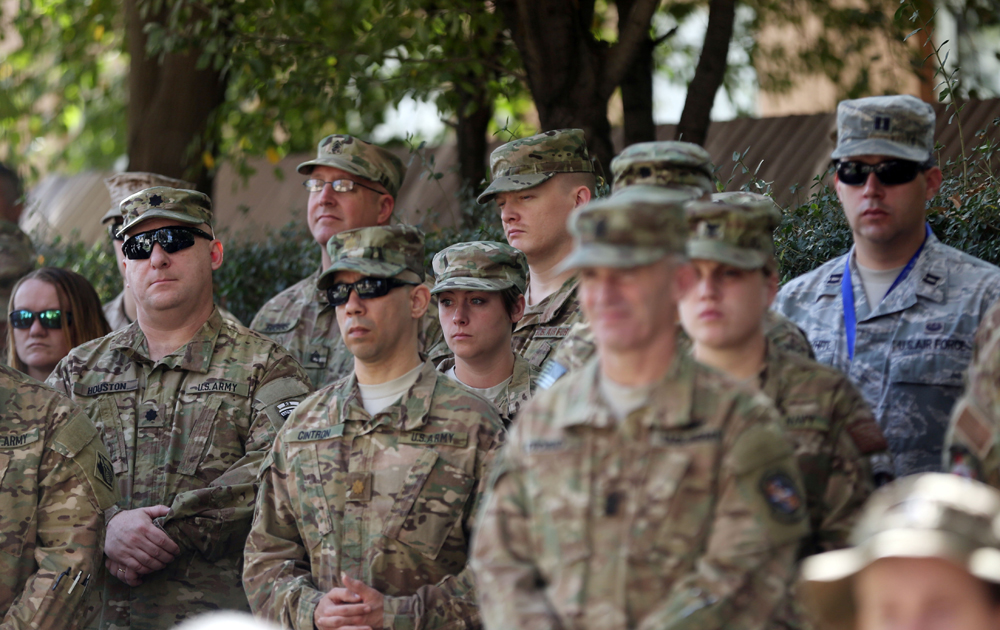
“Troops in every region ask first about the National Defense Authorization Act,” Cotton said. (AP Photo)
Washington Examiner: You recently got back from a congressional delegation to the Middle East where you met with troops. Can you talk a little bit about what sort of issues you heard from them?
Cotton: Troops in every region ask first about the National Defense Authorization Act. They wondered if the president really would veto it, and now they have their answer, he did. He’s using those troops as a bargaining chip for more domestic spending. They were all very surprised and I would say disappointed by that. It hurt their morale for sure. Secondly, they want to know in most countries if we’re committed to victory. In Iraq against the Islamic State, in Afghanistan against the Taliban and al Qaeda and now the Islamic State as well, and had some real reservations about the constraints put on their freedom of action in fighting the bad guys.
Examiner: You’re talking about the rules of engagement there?
Cotton: Yes.
Examiner: You’ve been critical of the administration’s strategy against the Islamic State. What specifically would you do differently or would you like to see him do differently?
Cotton: Well I would say they don’t have much of a strategy. They have a goal and the goal is the correct one: to degrade and ultimately defeat the Islamic State. But a strategy involves putting resources against ends so you have a means to achieve one’s ends, preferably a big impact goal with little or minimal cost. But in this case, they are not putting up anything like the resources they need. I think they still have a cap of 3,400 troops on the ground in Iraq. Those troops are far away from anything like the front line, they are largely doing training missions and those training missions don’t yet seem to be paying dividends in the fight against the Islamic State. Gen. [David] Petraeus, who obviously knows something about the region, testified in front of the Armed Services Committee recently that we should be a little bit more forward leaning, at a minimum embedding our troops at the brigade level, which still wouldn’t put them on the front lines of combat, but would get them closer to the decisive point where the Iraqi Security Forces need the kind of professional expertise that our Army can provide. These are not so much trigger-pullers or door-kickers as they are professional logistics advisers, tactical air controllers or other kinds of supporters and enablers that is the hallmark of our Army and is not the hallmark of any developing world Army.
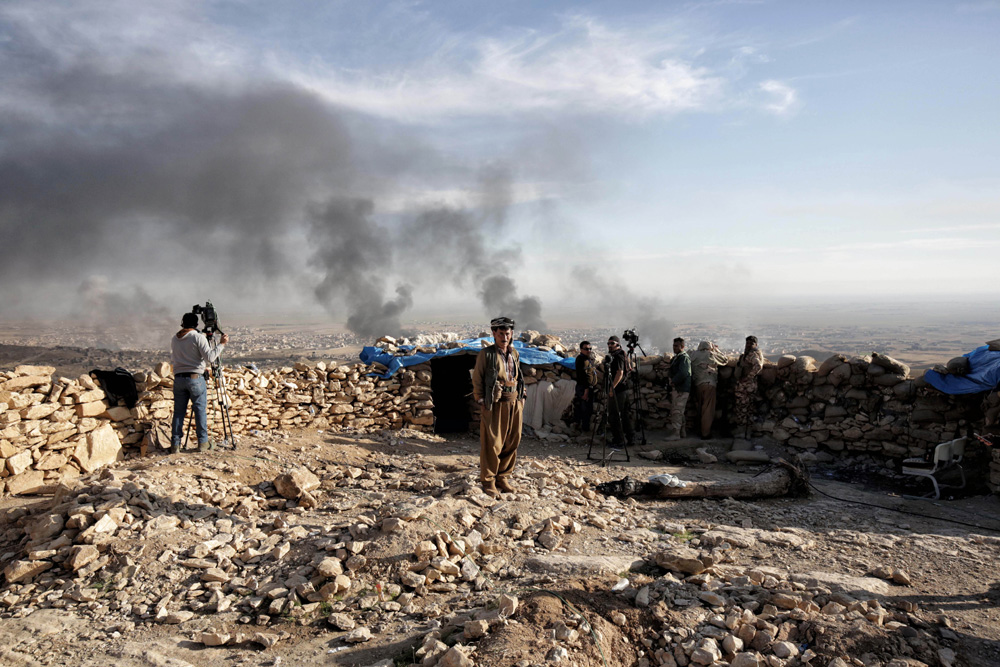
The Obama administration has a goal “and the goal is the correct one: to degrade and ultimately defeat the Islamic State,” the Arkansas senator said. (AP Photo)
Examiner: You talked about putting troops closer to the front lines, with the raid last month [in Iraq to rescue 70 hostages] there’s been a lot of talk about the definition of combat and if U.S. troops are in combat. Do you see the mission against Islamic State as a combat mission and do you think it’s mission creep from what the administration has promised?
Cotton: Any time American soldiers are being shot and killed on the battlefield, they’re in combat, whatever politician in Washington would like to say. So of course some of our troops obviously are fighting in combat. That may not be the primary mission, it may not be the intended mission, but any time we send troops on the battlefield and support them, whether they’re American troops or allied troops, then there’s the possibility that those troops will need support. So any time American soldiers are taking fire, they are in combat operations. This goes to show that again, you win wars on battlefields. You don’t win wars through politically correct rhetoric in Washington, D.C.
Examiner: Do you think the messaging surrounding this is problematic given the administration repeatedly saying that it’s not combat even though troops are getting into firefights and are being killed?
Cotton: It’s part of a long pattern that President Obama has of running military operations based on political needs or political goals. Just like withdrawing all of our troops from Iraq in 2011, the conditions on the ground clearly didn’t warrant it, but he had made that promise in the campaign and rather than explain to the American people why the conditions on the ground had changed and therefore our policy needed to change, he simply went blindly ahead with this promise. In Afghanistan, his endless handwringing about whether we would keep troops on the ground, even in the end if he extends the current levels, has had a real consequence because it’s undermined the commitment of our allies and emboldened our adversaries thinking that America is going to withdraw those troops. And we still don’t know for sure if he’s going to make a conditions-based decision next year or if he’s just going to try to once again uphold a political promise made eight years ago that has nothing to do with reality today. That’s part of the pattern you see with the death of Sgt. [Joshua] Wheeler last week in Iraq as the desire to tell one political story no matter what the facts are on the ground.
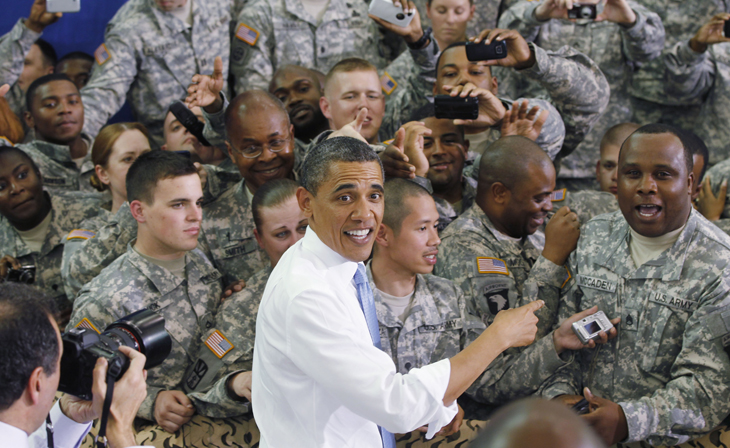
“President Obama has largely retreated from the position of American leadership that we’ve, through both parties of all administrations since World war II, upheld,” Cotton said. (AP Photo)
Examiner: This is a question that military leaders faced at the Senate Armed Services Committee when they testified at their confirmations. What’s the biggest threat that you see facing the country today?
Cotton: Well the biggest threat in the world is the overall retreat of America from its traditional post-World War II role of global leadership. That’s why our adversaries like Russia and China and Iran and North Korea and transnational terrorist groups like the Islamic State and al Qaeda continue to grow as specific threats to us because President Obama has largely retreated from the position of American leadership that we’ve, through both parties of all administrations since World war II, upheld. Now when you get down to specific countries, yes, Russia is the one country that has the ability to destroy America and our way of life because of their nuclear arsenal. That’s what makes Vladimir Putin’s threats so dangerous in Europe, in the Middle East, and directly against the United States. However, a country like Iran, which is governed by a bunch of crazed mullahs who continue to chant, “Death to America,” and therefore clearly show the intent to kill Americans and to do so in a mass-casualty scale, are now on the verge of having the means to achieve that goal because of the nuclear deal that the president went forward with.
Examiner: You talked about Russia, can you talk a little bit about Putin’s escalation in Ukraine, in Syria and what you would do differently in those situations?
Cotton: I think Vladimir Putin took the measure of Barack Obama in the summer of 2008 when Vladimir Putin invaded Georgia and Barack Obama called on both sides to exercise restraint. Think about the message that sent to Vladimir Putin when a Democratic presidential nominee called on a country being invaded by Russia to exercise restraint. And time and again, for the last seven years, Vladimir Putin has wrong-footed President Obama because he knows that President Obama wants to avoid confrontation at all costs. Our policy against Russia should be one of confrontation and pressure. Russia has a weak hand, the United States and the West has a strong hand, but Russia continues to play it well. So in Syria, for instance, we should have strongly, strongly encouraged Iraq not to allow overflight into Syria to take all those troops and all that equipment and all those personnel, we should continue to do so. We should establish a safe haven, a no-fly zone, at least in southern Syria before Russia gets there, as they’ve already gotten to northwestern Syria, since that is after all right on the border of two of our closest allies in the region, Jordan and Israel. We should not be including Russia in negotiations about Syria. One of Vladimir Putin’s prime objectives in having taken the fight into Syria to begin with was to be a key or in fact the key player in negotiations. But we also have to recognize that Vladimir Putin is not playing in these countries on a one-by-one strategy, he has a global strategy to diminish American power and prestige and restore Russia as a leading global super power that leads a rival block against the United States. So we should fight him in Europe as well.
In Ukraine, we should provide javelins and other kinds of anti-armor weapons to the Ukrainian government, which has desperately pleaded for them for months, so they can counteract the Russian-supplied rebels in Eastern Ukraine. We should provide them more intelligence about what Russia is doing on its side of the Russian border so they know when attacks are about to come. We should continue to mentor their government so their government can make the move to the Western way of organizing its economy and its society as they wish. Moving north to the Baltics, we should reinforce our troop presence there, we should strongly consider a permanent troop presence in the Baltics and in Poland to show those countries that they’re not going to once again be buffer states between the West and Russia and also show Vladimir Putin that we take our NATO obligations very seriously. And then coming up off the battlefield and in the realm of direct or multilateral relationships, we should renew the sanctions in January. I would say that we should probably expand the sanctions in January, expand them to more of Vladimir Putin’s inner circle, to their spouses, to their children and potentially to entire sectors of their industry. Vladimir Putin is waging a proxy war against the United States. We don’t get a choice whether the war is being waged, we only get a choice in whether we win or lose it.
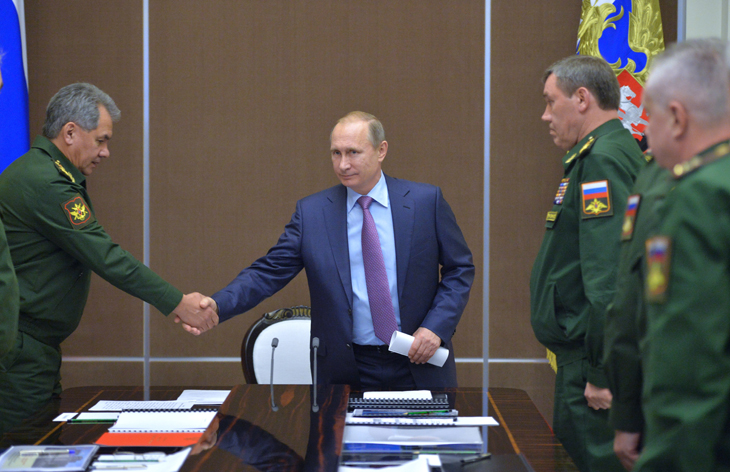
“[T]ime and again, for the last seven years, Vladimir Putin has wrong-footed President Obama because he knows that President Obama wants to avoid confrontation at all costs,” Cotton said. (AP Photo)
Examiner: There’s obviously a lot of threats in the world today. Are foreign threats a bigger issue facing the military today than the internal struggle to reform the bloated benefits system and bureaucracy?
Cotton: Our overseas adversaries pose a greater risk to Americans and to American interests. Our military is there to protect Americans and protect America’s interests. We have some reforms that we need to undertake in our military to ensure that they can perform that role. We also need to substantially increase the military budget to ensure that they can perform that role. That’s one reason why President Obama’s veto of the National Defense Authorization Act, holding the troops hostage over his desire for more domestic spending, is so harmful, because that legislation includes a lot of important reforms. For instance, the reforms to the military retirement system in which now more than 80 percent of troops receive no retirement when they leave in less than 20 years. We would go to a system like a 401k system with a blended pension as well that would mean over 80 percent of troops likely would get a retirement system, probably a savings for the taxpayer as well. Same thing with reforms to procurement, allowing more block purchases with multi-year authorities, which is the best way right now to decrease the amount of money we’re spending on some major acquisition systems by ramping up production and getting discounts. These are very basic reforms that our military needs and that the Congress wants to provide and Barack Obama is blocking them.
Examiner: Can you talk a little bit about any other benefits that you think need to be reformed and how Congress can work on that without backlash from veterans groups?
Cotton: The compensation reform commission did a lot of work on this. They took input in the form of scientific input, in the form of polling, anecdotal input in the form of town halls and other kinds of focus groups and that’s what we tried to incorporate into our bill, in particular the retirement system. As someone who myself served less than 20 years, I would have been very happy if there was some kind of 401k system in addition to the 20-year pension benefit so I could have left the military with some kind of small retirement savings. Most soldiers, sailors, airmen and Marines I think would like that as well. That’s one of the most important reforms we can take, but also being good for retention in the future when soldiers, sailors, airmen and Marines reach those critical marks where we’re trying to keep that in the service because of the hard won experience they received. I think more broadly we need to look at all the things the Department of Defense does that is not fighting and winning our wars, which means hopefully stopping them from beginning in the first place. We have an entire grocery system, we have a postal system, we have a school system. All those things may be appropriate things the Department of Defense needs to do because of the austere and often overseas environments to which we assign our troops and their families, but I think we need to take a look at all of the support systems the Department of Defense has, decide whether or not the best way to handle those is through the Department of Defense managing them or perhaps through a different arrangement that may rely on other agencies that have better skill sets in those areas or in the private sector.
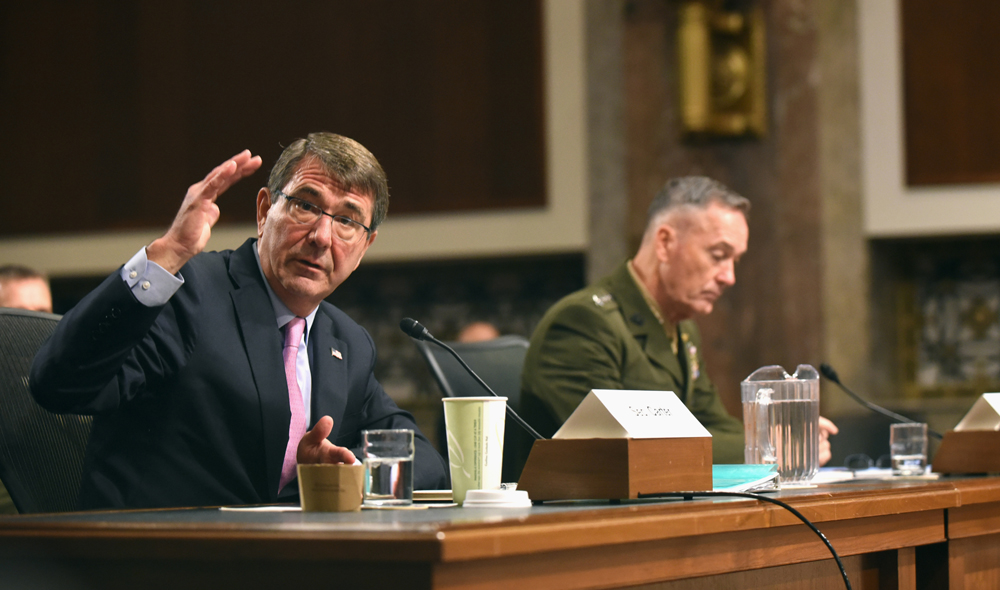
Military leaders faced tough questions at the Senate Armed Services Committee hearings. (AP Photo)
Examiner: You’re coming up on a year almost since you were elected to the Senate. What’s surprised you the most about the upper chamber compared to your time in the House?
Cotton: Things move a little bit more slowly in the Senate than they did in the House, that’s for sure. But you know, that’s the role that our Founding Fathers intended for the Senate to play, and while I wish they moved faster and I sometimes get frustrated at the pace, it also helps to force consensus across not just the parties but across all the regions of our country, which is a very large and diverse country and hopefully achieve real policy results for the American people that are going to be good for our military, good for our economy, good for families and so forth. But things do move quite a bit slower over here than they did in the House.
